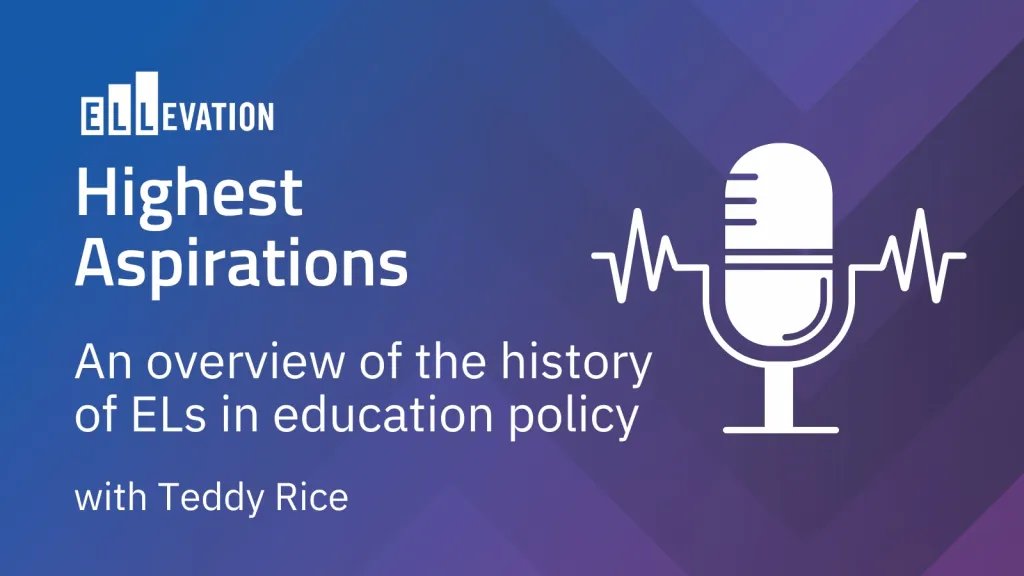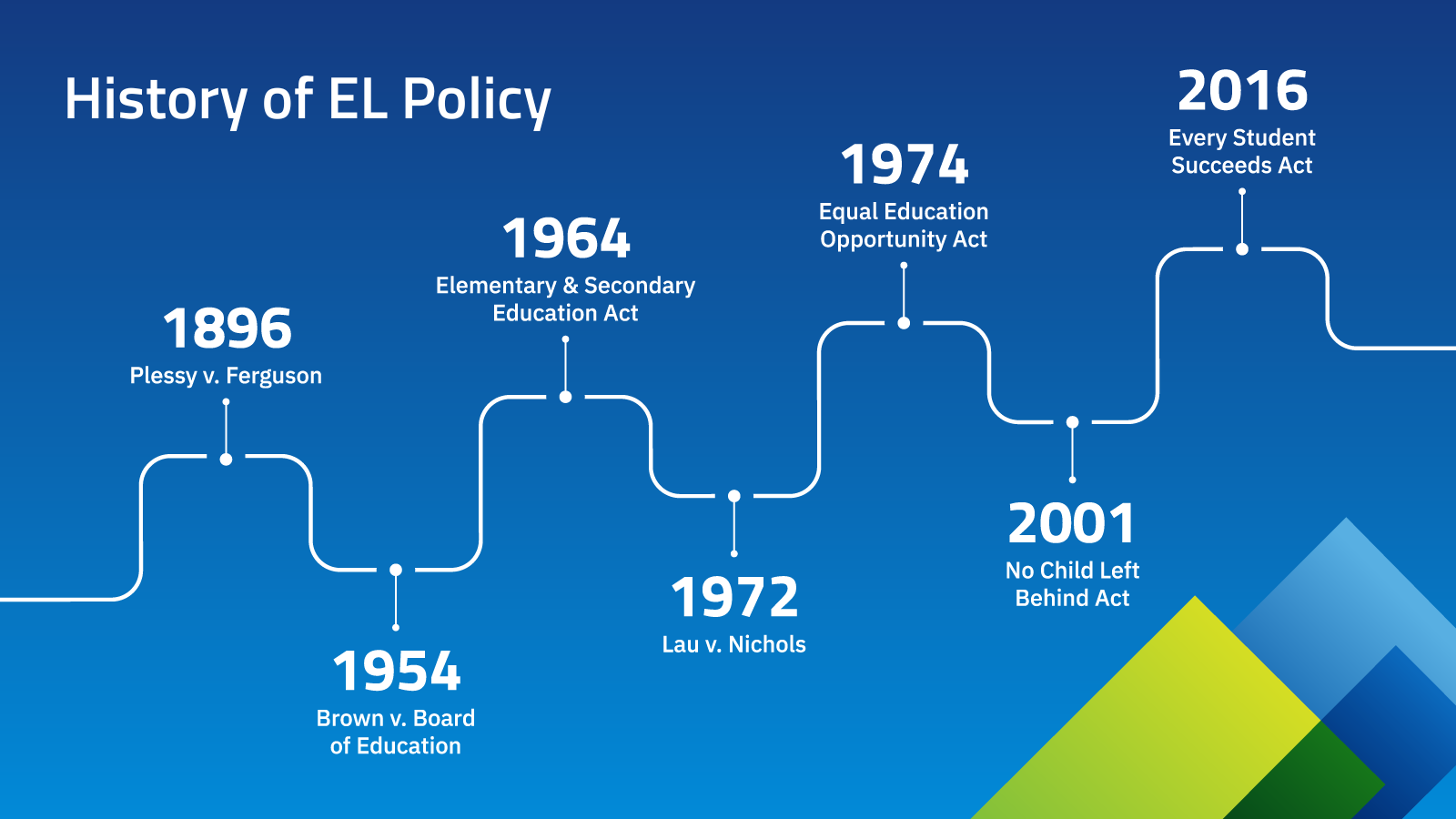An overview of the history of ELs in education policy


An overview of the history of ELs in education policy
What are some key rulings in the history of EL policy and how have they impacted education equity and access? What challenges do multilingual students currently face in education and how can we better advocate for them in policy and legislation? Learn more with Ellevation co-founder Teddy Rice.
When Teddy Rice co-founded Ellevation alongside Jordan Meranus in 2011, they saw a need for innovation focused on English learners. They envisioned a solution that would help educators and school districts address their unique challenges in serving the needs of their English learners in the ever-changing education environment.
Today, Teddy Rice is the President of a company of over 200 employees working with schools in almost every state across the country, and still personally delivers the same onboarding session to each person who joins the team. His lesson covers the history of policies and rulings that have impacted the learning environment and opportunities for MLLs, which he believes is key context for the population of students we all are serving.
We believe this conversation will be beneficial to share out with our wider EL community, who all identify in one way or another as advocates for multilingual learners. By grounding in what happened yesterday, we can better understand our classrooms today.
Listen to the full episode or find some key takeaways from the conversation below.
An overview of major events in the history of EL education policy:

Key outcomes from rulings:
- 1896 - Plessy v. Ferguson - Landmark Supreme Court decision that made “separate but equal” satisfactory in the eyes of the law, effectively making racial segregation in schools legal.
- 1954 - Brown v. Board of Education - Separate educational facilities are inherently unequal, began movements for civil rights with leaders like Dr. King, Chicano movement, Native American student treatment and more.
- 1972 - Lau v. Nichols - Decided that lack of supplemental language instruction in public schools for students with limited English proficiency violated the Civil Rights act of 1964.
While all of these court rulings and acts have created the current conditions today facing multilingual learners, two of the most recent acts are particularly interesting in the context of the work many educators are involved in.
The No Child Left Behind Act (NCLB) of 2001 under President George W. Bush is widely remembered today as a very unpopular law with both ends of the political spectrum. However, Rice explains a positive legacy of the law was the requirement that districts identify who their ELs were and measure their progress each year on language proficiency assessments. The law introduced a new spotlight on the students which necessitated transparency and created a regulatory framework in support of growth for ELs.
One of the flaws of NCLB was that the policy was oriented towards district administrators and the expectation in every district was that the ELs were the responsibility of EL coordinators and their small team. In some situations, this created a dynamic where classroom teachers tended to view ELs as “not their responsibility”.
There were two other major complaints:
- From the more conservative Republican side, people felt there was too much authority vested in the US Department of Education (DOE) to penalize and sanction districts for lack of student performance/growth
- From the Democrat Coalition side, there were grievances over unrealistic expectations about standardized test proficiency that felt dehumanizing, unrealistic, and demoralizing
The Every Student Succeeds Act (ESSA) of 2016 replaced NCLB in large part to solve some of the above complaints or flaws from the policy. ESSA gave significantly more control to the states and districts in determining the standards that students are held to, but the DOE still holds states accountable for implementing ambitious goals and measuring their success.
Rice notes another important shift in the environment around EL education that came about at the same time as ESSA.
“I don't know if this is a parallel development or a sequential development. But there's a wider spread understanding and appreciation for the value of language and culture. The laws that in particular had been in Massachusetts and California, Arizona that required English only instruction and prohibited bilingual education, in many cases, have fallen by the wayside….I think there's this really interesting and positive development where we're seeing more respect for native language, native culture, and how to include that in instruction. Not merely because there's all these other good cognitive benefits and stuff, but people now finally appreciate that it doesn't hurt you learning English to celebrate your native language. It actually helps you.”
Biggest challenges educators of MLLs are currently facing
Rice acknowledges that this is very much an ongoing process of refining and reimagining the best systems for supporting our EL students and educators. The rapidly changing educational landscape inevitably creates challenges for teachers working to meet the individual needs of each student.
“It's just a lot of gray clouds that I think would make it hard to be a teacher today. And if I were to speak some to the specifics around English learners…We remain this unbelievable country that accepts kids from all over the place…and the immigrants who are coming are arriving with new levels of trauma, and are coming from all over the world with lots of different cultural lenses that make it super complex for teachers.”
This complexity goes beyond the work of preparing for lessons in class. Educators and administrators supporting linguistically diverse classrooms are simultaneously concerned with political discourse happening at school boards, resource shortages, teacher burnout and vacancies, and more.
Rice believes that the mission of Ellevation and the solutions the company provides can help to lift some of this latent stress that educators are dealing with in their roles.
“I would focus on helping districts and district leaders. First of all, I think we can help them give them the confidence that they can continue to do important work with great results. This is not stuff that's mysterious anymore. We know how to help English learners achieve their highest aspirations. And the work is just putting your shoulder down and knowing that when you put in the effort, you can get the results. We see it every day.”
Reflecting on rapid growth of EL student populations
Finally, we end our conversation on a note about the growth of EL populations across the country and what that means for the larger movement of advocating for equitable opportunities for these students.
“One of the reasons why I think some of these English learner policies have been more enduring is because it is such a shared experience now. You are just as likely to need to really know how to work with English learners if you live in Norfolk, Virginia or Bentonville, Arkansas as somewhere in Texas. These are places that themselves have very diverse communities now. And so everyone cares about English learners. Everyone wants to serve them more effectively.
Everyone knows that their own economies are absolutely dependent on those EL students emerging from their school districts with the skills they need to be productive contributors to the democracy and to their economy. By and large, I think that's a very bipartisan message and bipartisan objective. People can have different beliefs about these things. But ultimately, we all want really well-educated, multilingual members of our communities.”
Download the full episode transcript.
Episode resources:
- Read Rice’s book recommendation Dominion by Tom Holland
- Listen to The History of English Language Podcast
- Learn more about the history of Ellevation
- Finally, read more on how to apply this information to be a better advocate for your ELs